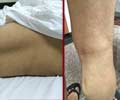- Muscle twitching - (https://www.nlm.nih.gov/medlineplus/ency/article/003296.htm)
- What Causes Muscle Twitches? - (https://kidshealth.org/en/teens/twitches.html)
- Fasciculation - (https://en.wikipedia.org/wiki/Fasciculation)
- Myoclonus (Muscle Twitch) - (https://my.clevelandclinic.org/health/diseases/15301-myoclonus-muscle-twitch)
What is Muscle Twitching?
Muscle twitching is an experience of sudden involuntary repetitive muscle contraction and relaxation, usually visible under the skin. Twitching of a muscle is called fasciculation. In addition, some people experience spontaneous contraction of a group of muscles. This is referred to as myoclonus.
Muscles in our body are made of thin filaments or fibers of two types called actin and myosin. The actin and myosin fibers slide past one another to produce a contraction of the muscle cell, changing its shape and length.
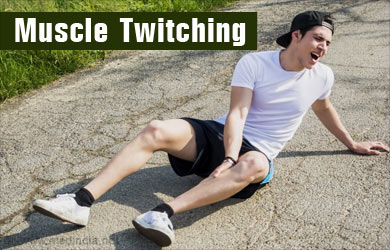
Stimulation of muscles by nerves causes contraction of muscles. Normally, the nerves are controlled by the brain and spinal cord. Thus, when a person wants to contract a muscle, the signal goes from the central nervous system via the nerves to the muscle, which results in a voluntary contraction. In some cases, the nerves may signal to the muscle to contract without the person actually wanting the action. These result in involuntary muscle contractions or muscle twitches. A fasciculation appears when the cause of twitching is in the nerve or in the muscle itself. On the other hand, myoclonus usually happens due to altered signals from the brain or spinal cord.
What are the Causes of Muscle Twitching?
Muscle twitching occurs due to various reasons. Some of the lifestyle-related conditions that cause muscle twitching include:
- Tiredness after a physical activity or exercise
- Stress and anxiety
- Irritation of the eyelids or the eyeball
- Nutritional deficiency like calcium, magnesium and iron deficiency
- Lack of adequate sleep
- Metabolic disorders such as low potassium and high urea levels
- As side-effects of drugs like diuretics, stimulants and estrogen

There are some serious illnesses, especially neurological conditions that may cause muscle twitching.
- Amyotropic lateral sclerosis
- Spinal muscular dystrophy
- Myasthenia gravis
- Isaac’s syndrome (neuromyotonia)
- Muscle wasting or weakness (myopathy)
- Motor nerve damage
- Poliomyelitis
- Kidney failure
- Head or spinal cord injuries
- Liver failure
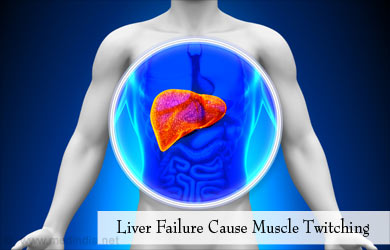
What are the Types of Myoclonus?
There are four types of myoclonus.
- Essential myoclonus: This type of muscle twitching is not caused by any serious medical condition and remains the same over time.
- Opsoclonus myoclonus: It is a rare neurological condition in which there are sudden, brief muscle spasms and rapid eye movements. It is therefore called dancing eyes-dancing feet syndrome. Tumors in brain and viral infection cause this condition. Patient may also have speech problem.
- Stimulus sensitive myoclonus: Muscle twitching that is triggered by external stimuli like loud noise, lights or sudden movements is called stimulus-sensitive myoclonus.
- Action myoclonus: Muscle twitching that occurs when a voluntary movement is initiated is called action myoclonus. It makes daily activities very difficult as the muscles go into spasm when the patient intends to do some work. The spasms affect arms, legs, face and vocal muscles.
What are the Symptoms and Signs of Muscle Twitching?
Symptom of muscle twitching is the feeling of constant muscle contraction and release. Various other symptoms have been described by sufferers.
- A feeling of ants running on the skin.
- Inability to perform voluntary movements due to spasms in the muscle
- Increased twitching with voluntary movements, but no twitching during rest
- Weakness in the twitching muscle.
- Tingling sensation
- Tremors
- Hyperreflexia (overactive reflexes or responses)
- Paresthesia (like the feelings of “pins and needles”)
- Numbness in the muscle
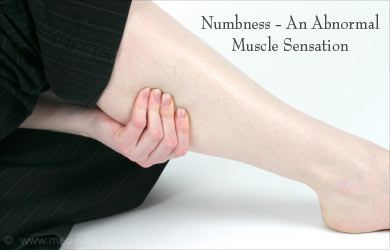
How to Diagnose Muscle Twitching?
A history of muscle twitching is obtained from the patient. The patient is subjected to a complete neurological examination. Strength testing of muscles is done to test for weakness, which could possibly be a sign of an underlying pathology. Some examples of strength tests for muscles are ability to walk on heels and toes, squeezing fingers together, etc.
Electromyography, which records muscle activity, and nerve conduction studies are used in the diagnosis of muscle twitching. Several other tests are carried out to diagnose the cause of muscle twitching. These include:
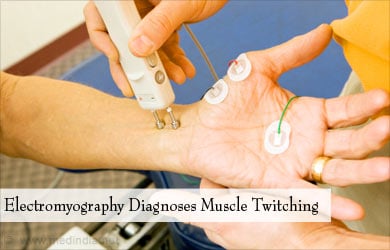
- Presence of toxic heavy metals in the body like mercury, lead, etc.
- Thyroid function tests
- Liver tests
- Kidney function tests
- Blood electrolytes
- CT or MRI scan of the brain
Advertisement How do you Treat Muscle Twitching?
Treatment of muscle twitching depends upon the underlying cause. Neurological causes of muscle twitch need immediate attention.
The following are the possible treatments for muscle twitching that do not have any apparent cause:
- Replacement of nutritional deficiencies like magnesium or calcium with dietary sources or supplements.
- Drinking lot of water.
- Rest period after sustained stress or continuous physical activity.
- Reducing stress and anxiety with relaxation and meditation.
- Massages for immediate relief.
- Stretching the muscle by pushing against the wall taking care not to overstretch.
- Exercises to strengthen muscles.

Medications that are usually suggested and prescribed for muscle twitching include the following.
- Medications like anti-seizure drugs or beta-blockers for severe muscle twitching
- Magnesium supplements to correct magnesium deficiency
- Muscle relaxants (example: diazepam, carisoprodol)
- Pain medicines like ibuprofen or acetaminophen to relieve muscle aches
How do you Prevent Muscle Twitching?
- Cut down on caffeine and replace with plenty of water. Dehydration can cause muscle twitching.
- Eat nutritious food. Calcium and magnesium is required for the proper muscle functioning.
- Meditation and relaxation techniques can keep anxiety and stress at bay.
- Stretching exercises keeps the muscles loose and flexible and prevent cramps.
- Adequate sleep is sometimes the best remedy for muscle twitch.
- Improve your posture while sitting, standing and walking.
Health Tips
- Exercise at least 30 minutes a day, for five days a week. Exercise keeps the muscles moving and flexible. It also prevents wasting of muscles.
- Yoga, meditation, relaxation and stretching can help keep stress and anxiety away.
- Balanced diet and nutritious food is the key to maintaining a healthy body.
- Consult your health care provider if the muscle twitch lasts for more than 2 weeks.
- Neurological causes of muscle twitch must be attended and treated as soon as possible.






